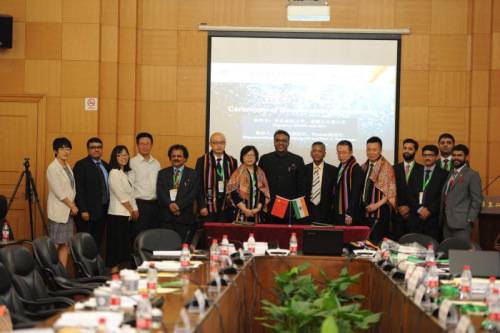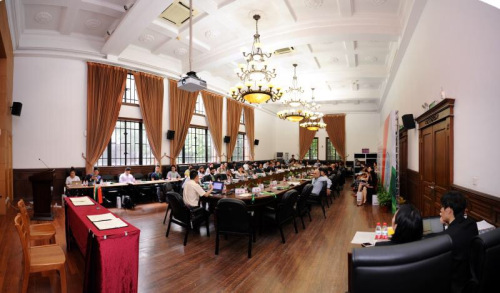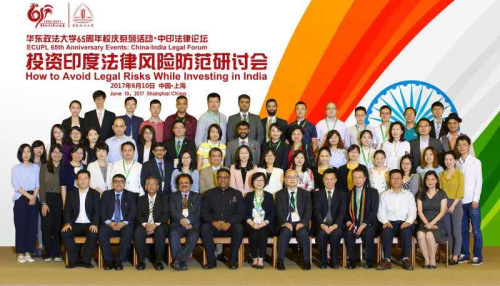Monthly Archives: June 2017
Role difference of Parliament and Union Government on regulating FDI In India the Constitution is Supreme . It made the Parliament as Superior in the constitutional architecture by giving powers to enact law for Executive for implementation and Judiciary for interpretation .Hence the executive is accountable to Parliament. The Ministers are the executive authority under the Prime Minister who enjoys majority support of the House of People ( Lok Sabha) . ‘The council of Ministers shall be collectively responsible to the House of the People'( Article 75(3) Constitution of India).The executive is assisted by permanent bureaucracy ( civil servants)under(Art 309 ) the Constitution of India. Regulation of FDI: Regulation of FDI is done on the basis of Parliament enactments and subordinate legislation which are tabled in the Parliament by the Government . Every Financial year the Annual Financial Statements ( Annual Budget ) is laid before the House of the People where the annual policy statements, taxation and expenditures are explained by the government . Ministry of Finance through Department of Revenue looks after administration of the Foreign Exchange Management Act, 1999(FEMA) by issuing transparent system of subordinate legislation , rules , regulations and notifications regarding FDI. Under the Reserve Bank of Act (Amendment and Misc . Provisions) Act, 1953 , the Reserve Bank of India regulates FDI and FII . Similarly Ministry administers the Securities and Exchange Board of India Act 1992 enables the statutory Body SEBI by rules, regulations and notifications. The Insolvency and Bankruptcy code 2016 regulates the Financial institutions and companies regarding their obligation in the event of act of Insolvency or bankruptcy. THE FOREIGN TRADE (DEVELOPMENT AND REGULATION) ACT, 1992 is administered through the Commerce and Industry especially department of Industrial Policy and Implementation , issues the FDI policy every year . The latest Policy 2016 came into force from June 7, 2016. It says “TheGovernment has put in place a policy frame work on Foreign Direct Investment, which is transparent, predictable and easily comprehensible. This framework is embodied in the Circular on Consolidated FDI Policy, which may be updated every year, to capture and keep pace with the regulatory changes, effected in the interregnum. The Department of Industrial Policy and Promotion (DIPP), Ministry of Commerce & Industry, Government of India makes policy pronouncements on FDI through Press Notes/Press Releases which are notified by the Reserve Bank of India as amendments to the Foreign Exchange Management (Transfer or Issue of Security by Persons Resident Outside India) Regulations, 2000 (notification No. FEMA 20/2000-RB dated May 3, 2000). These notifications take effect from the date of issue of Press Notes/ Press Releases, unless specified otherwise therein. In case of any conflict, the relevant FEMA Notification will prevail. The procedural instructions are issued by the Reserve Bank of India vide A.P. (DIR Series) Circulars. The regulatory framework, over a period of time, thus, consists of Acts, Regulations, Press Notes, Press Releases, Clarifications, etc.” Parliamentary Role in the formulation and implementation of Policy: The executive is accountable to parliament. The Policy making is the prerogative to the elected Government. When the Parliament is informed of Policy changes it has the opportunity to put forth the public opinion and negative aspects of a particular public policy. With in theParliament a system of Department Related Parliamentary Standing Committees are constituted by Speaker/ Chairman of House of Parliament numbering 31 Members of Parliament from both the houses of Parliament represented by different political parties proportionate to the number of Parliament Members of each Party.This DRPSC has been given wider opportunity to get the citizens and stake holders opinions and suggestions. The highest official in Government and Statutory Institutions are to present the government policy and proposal of legislation and programmes to the Parliamentary Standing Committees numbering 24. After having discussed in depth on various aspects of the proposed laws or regulations or on existing laws and regulations the committee can make their recommendations . For example Department related Parliament Standing committee for Commerce in one of its reports as No 126 submitted to Parliament on 3rd May 2016 suggests as follows: “2.12 The Committee has made exhaustive observations/recommendations in its 122nd Report on Ease of Doing Business for consideration and action there on by the Department. The Committee hopes that the Department will take necessary action on the recommendations of the Committee to facilitate a visible impact on ease of doing business. The Committee is happy to learn that the Department is actively engaging the State Governments on the issue. It is true that without the State Governments’ intervention/participation, no significant progress can be made to create an industrial friendly framework in the country. The Committee notes that the Department has shared a 340 point Action Plan with States to bring in the desired structural reforms for ease of doing business and is set to assign real-time rankings to States on their business reforms by April, 2016. The Committee, while welcoming the efforts of the Department to engage the State Governments on a robust basis, also hopes that the Department will go extra mile to engage those States which due to historical reasons like industrial backwardness, difficult terrain, etc. do not have sufficient incentives to undertake business reforms. 2.13 The Committee also firmly believes that there must be a mechanism for immediate review of obsolete and outdated laws/rules which impinge upon the optimal working of industries as well as creation of an attractive business environment. On enquiring about the status of review of such laws, the Department informed that review of laws is a work in progress and views on continuance, modifications or repeal are yet to crystallise. The Committee finds the reply of the Department less than satisfactory. The business environment of the country is riddled in a web of obsolete and redundant laws which hamper production, competitiveness and investment as a consequence. The Committee desires that an internal committee may be formed to review outdated and obsolete laws/ rules being implemented by the Department and set a timeline to repeal such laws. The Department should make concerted efforts to ensure an effective and enabling environment for the industry by repealing the antiquated laws. 4.4 The Department informed the Committee that the FDI Policy framework is transparent, predictable and easily comprehensible. Now FDI upto 100% is permitted under automatic route for most sectors/ activities. The Committee welcomes the opening of most sectors of the economy for 100% FDI under automatic route. The Committee hopes that the Department has made due diligence before opening any sector of the economy for 50% plus FDI under automatic route. The Committee desires that FDI reforms must help in promotion of local entrepreneurship, innovation and spread of technology. It must be ensured that foreign investments do not become a vehicle of neo-colonialism where the country ends up being a supplier of cheap skilled workforce and act as a large domestic market to consume their production also.” Department of Industrial Policy and promotions This department (DIPP) has formulated FDI friendly policy such as: Introduction of composite cap: In order to provide simplicity to the FDI policy and bring clarity on application of conditionalities and approval requirements across various sectors, different kinds of foreign investments have been made functional under one composite cap. White Label ATM Operations: FDI up to 100% through automatic route has been allowed in White Label ATM Operations. Construction Development: Reforms in FDI Policy on Construction Development sector include: i. Removal of conditions of area restriction and minimum capitalization to be brought in within the period of six months of the commencement of business. ii. Exit and repatriation of foreign investment is now permitted after a lock-in-period of three years. Transfer of stake from one non-resident to another non-resident, without repatriation of investment is also neither to be subjected to any lock-in period nor to any government approval. iii. Exit is permitted at any time if project or trunk infrastructure is completed before the lock-in period. iv. 100% FDI under automatic route is permitted in completed projects for operation and management of townships, malls/ shopping complexes and business centres. Department of Economic Affair in the Finance Ministry: This department of Economic affairs looks after the formulation of Economic policy in consultation with Reserve Bank of India and Department of Industrial policy and Promotions. Hence Ministry of External Affairs is also getting inputs from concerned departments before making bilateral or multilateral agreements with other countries. Foreign capital invested in India is generally allowed to be repatriated along with capital appreciation, if any, after payment of taxes due on them, provided the investment was made on a repatriable basis. The repatriation is however, subject to any lock-in conditions that may be applicable on the industry sector under the foreign direct investment control regulations. Royalties and technical know-how: Indian companies that enter technology transfer agreements with foreign companies are permitted to remit payments for know-how and royalty under the terms of the foreign collaboration agreement subject to tax withholding, if any, without any limits. Conclusion : The roll of the Parliament is very important in open debate on the formulation of law, and subordinate legislation. In the aspect of delegated legislation the Government informs of regulations, rules, notifications by laying the same on the table of both houses. Which can be taken up the issue and debate in the Parliament and thus Government is accountable to the Parliament. Since India is a democratic Republic Union of States there will be transparency and predictability of the policy of government to reflect the aspirations and protect the welfare of the people. The term of office of the Political representatives and heads ( Ministers) based on elections as per Constitution of India the working of the government is in consonance to the Parliament even though opposition parties have to present their view to the knowledge of People at large. The electronic and print media are very vigilant in creating awareness to the people of the working of Parliament and Government.The rule of law and vibrant Judiciary are the complimentary strength and works as checks and balances of power as the architecture of Constitution is finely made and enforced.
Filed under Human Rights



